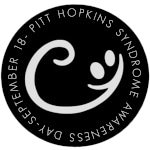Pitt-Hopkins Syndrome Awareness Day Date in the current year: September 18, 2026
 Pitt-Hopkins Syndrome Awareness Day, also known as Pitt-Hopkins Awareness Day, is observed annually on September 18. It was created to raise awareness of Pitt-Hopkins syndrome, a rare genetic disorder associated with chromosome 18.
Pitt-Hopkins Syndrome Awareness Day, also known as Pitt-Hopkins Awareness Day, is observed annually on September 18. It was created to raise awareness of Pitt-Hopkins syndrome, a rare genetic disorder associated with chromosome 18.Pitt-Hopkins syndrome (Pitt-Hopkins, PTHS) is an extremely rare neurodevelopmental disorder caused by a mutation or deletion of the TCF4 gene, which is located on chromosome 18 and encodes a protein that regulates gene expression critical for neurodevelopment. The syndrome is named after the Australian physicians David Pitt and Ian Hopkins, who first described it in 1978. However, the genetic cause of PTHS remained unknown until 2007.
Approximately 1,500 individuals worldwide have been diagnosed with PTHS, though its prevalence may be higher than estimated, as many cases likely remain undiagnosed due to the syndrome’s rarity. All cases appear to be spontaneous (de novo) mutations. The syndrome occurs in both males and females and does not seem to be linked to a specific ethnic background.
PTHS is characterized by distinctive facial features, developmental delay, intellectual disability, and other issues. Distinctive facial features associated with the syndrome include a broad nasal bridge and bulbous tip, wide mouth, pronounced Cupid’s bow, thin eyebrows, and prominent ears. Other physical features may include flat feet, short stature, and scoliosis.
PTHS is also characterized by developmental delay, including a lack of speech, as well as moderate to severe intellectual disability. However, it is difficult to measure the true intelligence of children with PTHS due to their motor and speech difficulties. Many children achieve more than initially expected thanks to therapies and augmentative communication. The Pitt Hopkins developmental spectrum may also include sensory disorders, anxiety, and ADHD.
Children with PTHS typically have a positive disposition, though they may exhibit aggressive or self-harming behaviors due to anxiety, sensory processing issues, and difficulty expressing themselves verbally. Other common issues in individuals with PTHS can include gastrointestinal problems (such as burping, reflux, and severe constipation), recurrent seizures, myopia, and breathing difficulties.
There is no cure for PTHS, but the symptoms can be treated to improve quality of life. Treatment focuses on specific symptoms and may require a medical team including neurologists, pulmonologists, ophthalmologists, gastroenterologists, and other specialists. Developmental delays and intellectual disabilities are addressed through occupational, physical, and speech therapies and special education.
Pitt-Hopkins Syndrome Awareness Day was established in 2013. The day’s main goals are to educate medical professionals and the general public about this rare disorder, support affected families, and raise funds for further research into better treatments and, ultimately, a cure. You can get involved by learning more about PTHS and sharing what you’ve learned with others, donating to an organization that supports patients or funds research, organizing a fundraiser, or spreading awareness on social media.
- Category
- International Observances
- Tags
- Pitt-Hopkins Syndrome Awareness Day, Pitt-Hopkins Awareness Day, international observances, awareness days, rare diseases